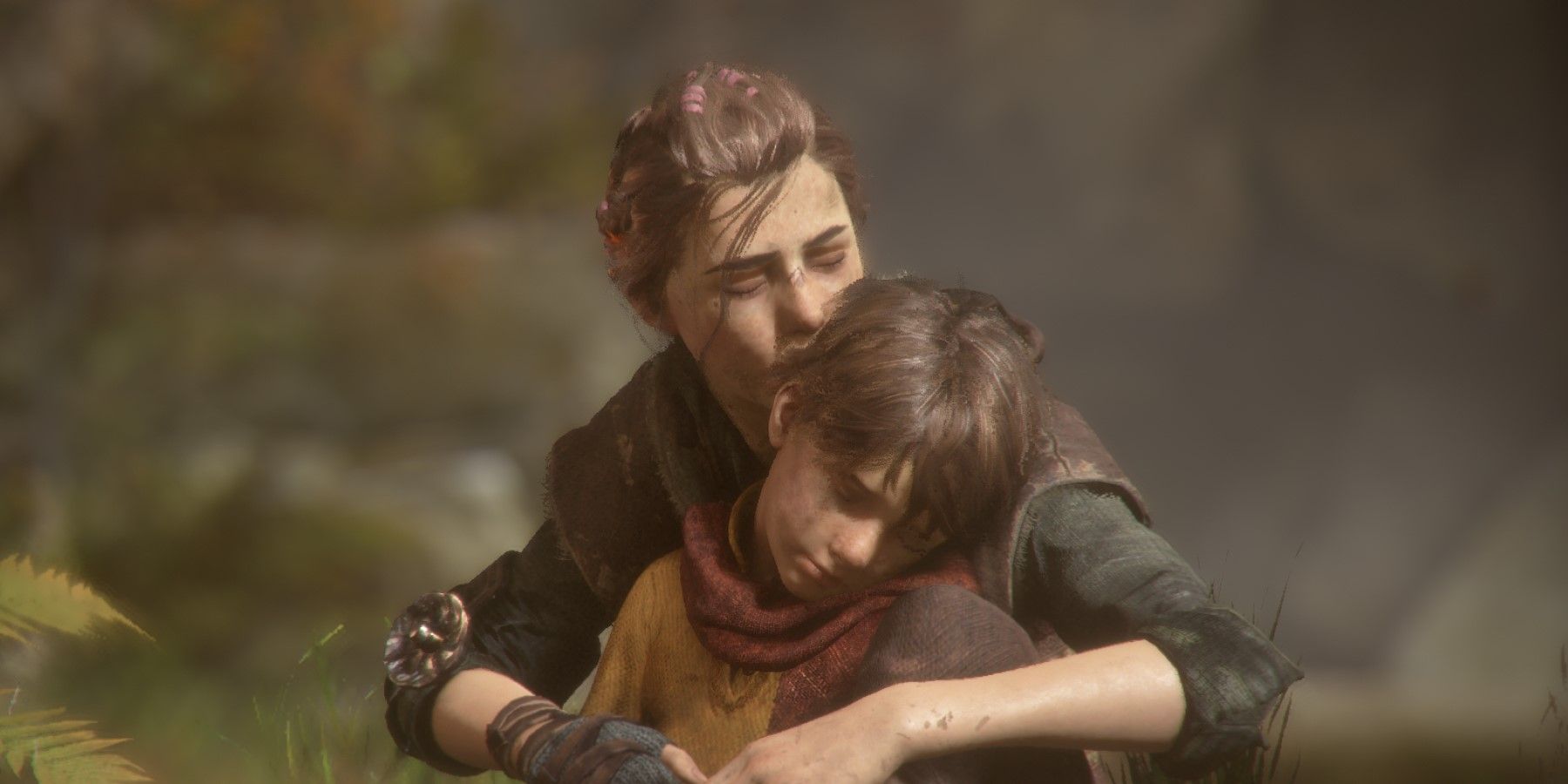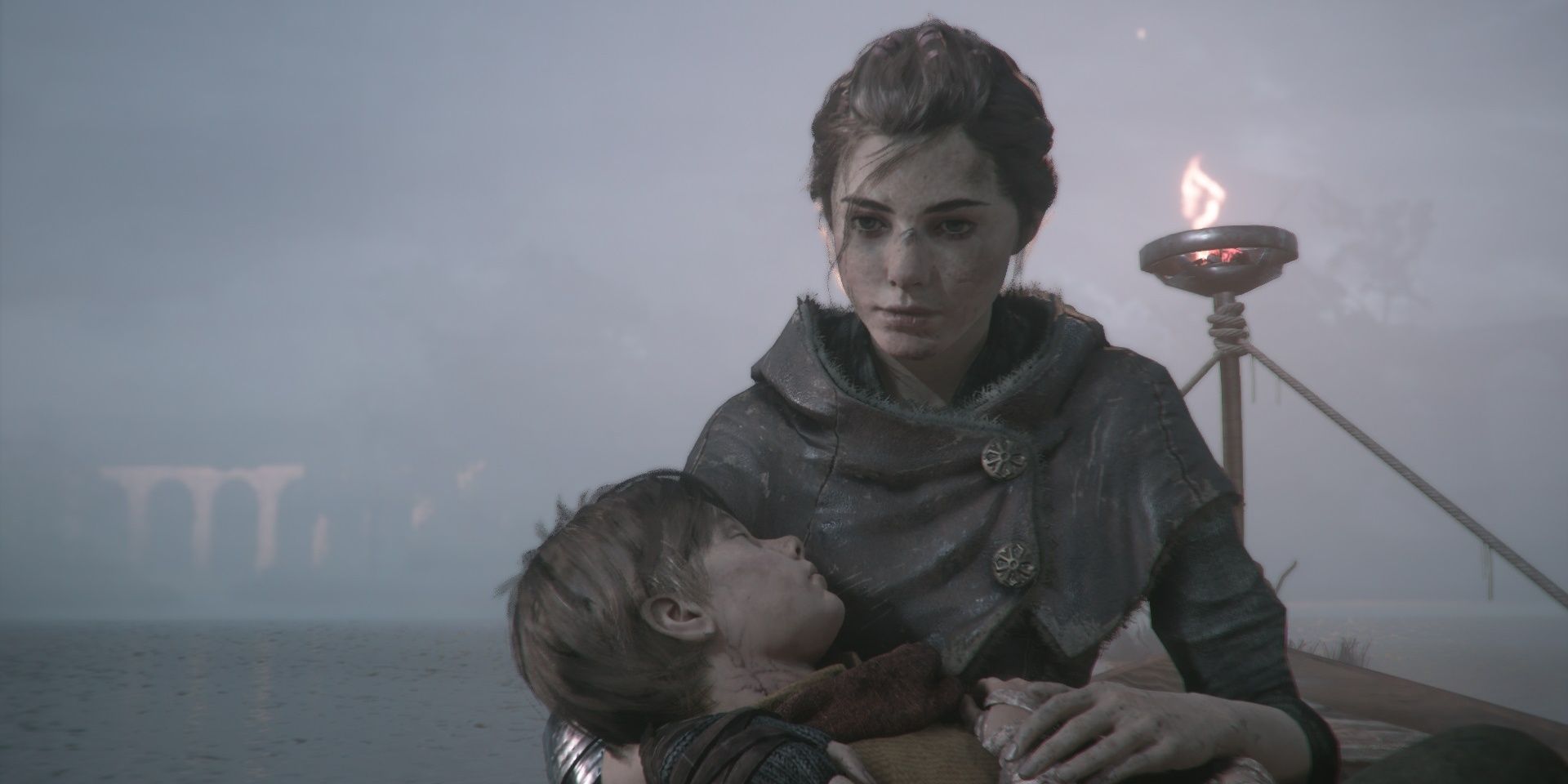A Plague Tale: Innocence takes players to the 14th century during the Hundred Years' War. Young Amicia de Rune is lucky enough to come from a royal family, but all is not well in her life. She does not get to see her younger brother Hugo de Rune mostly because he has been ill since birth, and he is always being cared for by her mother. Things take a turn for the worst when a terrible rat plague strikes, making normal life impossible. When the Inquisition comes around seeking Hugo, Amicia is forced to flee with him, taking them on a frightful journey involving plenty of creeping around, puzzle-solving, and dealing with a mysterious rat plague.
A Plague Tale: Innocence is filled with lots of frightful moments, and anyone who is phobic of rats might find the game difficult to play. However, behind the human suffering and pestilence, the game tells a touching story of siblings who have only each other to rely on in a cruel world. For any gamers who have experienced the highs and lows of being an older sibling, they may discover that Amicia's experiences are exceptionally relatable.
Being Older Means Being in Charge
There are plenty of brothers and sisters in gaming, and even they do not get to choose their siblings or what order their siblings are born in. If one happens to be an older sibling, there are a few perks that come with it. One of the first things older siblings realize is that they get to be the leader and take control of situations automatically. Little siblings tend to look up to their older brothers and sisters, and if there are big decisions to be made, it is the older siblings that are usually lucky enough to get the last word.
In A Plague Tale, Amicia discovers this after she and Hugo run away from the de Rune estate and have to fend for themselves. It is a very scary experience because the Inquisition is looking for Hugo, not to mention the hundreds of flesh-eating rats they have to avoid. With their parents not around, Amicia gets to take charge, and Hugo often looks to Amicia when he is afraid. Hugo holds her hand for much of their journey, and it is up to Amicia to ensure he stays safe.
Hugo's dependence on Amicia is also reflected in the gameplay. When going through stealth sections, Hugo and Amicia have to work together. They can split up, but Amicia cannot leave Hugo alone for too long, or else he will panic and begin crying which only attracts unwanted attention to him. Amicia can also instruct Hugo to perform certain tasks. This comes in handy, for instance, when they need to enter places that Amicia is too big to gain access to. Like a good younger sibling, Hugo usually listens to his older sister although, as one can expect from five-year-olds, he occasionally has moments of defiance.
Although Hugo is dependent on Amicia, A Plague Tale: Innocence is careful to also show that Hugo is a capable boy and that Amicia has a lot to learn from him. This occurs through Hugo's Herbarium, which is a series of collectibles that have Hugo finding flowers and putting them in Amicia's hair. Oftentimes, it is Hugo who is telling Amicia the name of the flowers and plants, and he even knows a bit about their uses. For example, when he picks Hawthorne, he informs Amicia that most people do not like it because it is thorny, but the plant is good for the heart. Amicia, who is impressed, with his botanical knowledge, learns that his mother taught him, and she asks him to teach her. In these moments, there is an interesting reversal of power roles, proving that while older siblings may always be in charge, they may not always be the ones who know the most.
Being Older Also Means More Responsibility
While it can be a power trip to be in charge and always have the deciding vote, this does not mean that being an older sibling does not have any downsides. Older siblings often find themselves bogged down with more responsibilities which can be stressful and overwhelming at times. If a younger sibling cries or is not doing what they are supposed to be doing, it is always the big brother or big sister's responsibility, even if they did not cause it.
In A Plague Tale: Innocence, Amicia discovers how troublesome the responsibilities of being an older sibling can be. Worst of all, there is no instruction manual on how to do things right which leaves a lot of room to make mistakes. This occurs when Amicia discovers that her mother, Beatrice, is still alive. Instead of revealing this to Hugo, she keeps it a secret to protect Hugo who would want to rush back to his mother no matter how unsafe it is. Amicia, having the humongous responsibility to protect her brother, chooses to lie to him. This has unintended consequences, however, because Hugo discovers that Amicia is lying and that breaks his trust in her.
Ultimately, it would have been better for Amicia to be honest with Hugo and try to explain things to him no matter how difficult it may be. However, Amicia is not yet an adult herself, and as she grapples with the responsibility of taking care of Hugo, she makes plenty of mistakes along the way. This comes with the territory when one is an older sibling, but if a sibling relationship is strong enough, it can survive all hardships.
With its thick French accents, rat swarms, and period clothing, A Plague Tale: Innocence has plenty of personality. Asobo Studio is not done with the series just yet, and the sequel titled A Plague Tale: Requiem is scheduled to release in 2022. This will allow gamers to continue Amicia and Hugo's journey as they stick together and face a world that does not leave innocence intact for long.
A Plague Tale: Innocence is available now on PC, PS4, PS5, Xbox One, and Xbox Series X/S.



